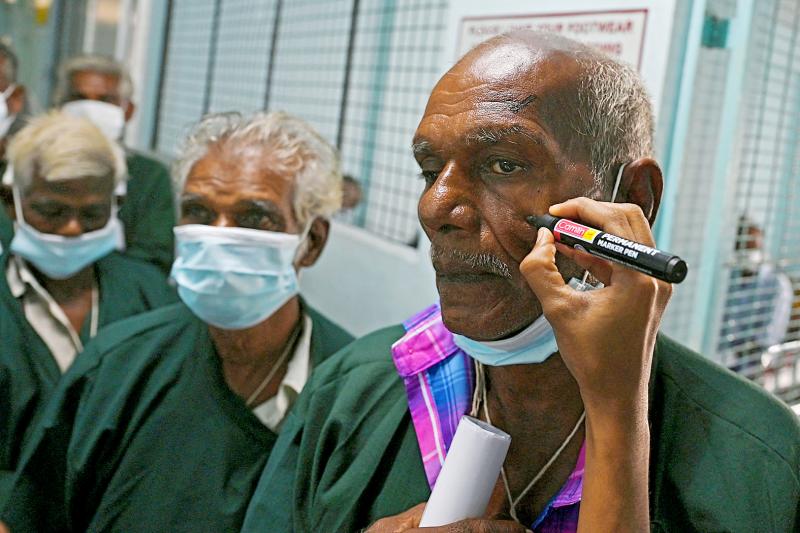Black ticks on their foreheads marking the eye to be operated on, dozens of patients in green overalls wait in line, beneficiaries of a pioneering Indian model that is restoring sight to millions. With a highly efficient assembly line model inspired by McDonald’s, the network of hospitals of the Aravind Eye Care System performs about 500,000 surgeries a year — many for free.
More than one-quarter of the world’s population, or about 2.2 billion people, have a vision impairment, and 1 billion of the cases could have been prevented, WHO data shows.
There are about 10 million blind people in India, and 50 million have some form of visual impairment. Cataracts — clouding of the eye lens — is the main cause.

Photo: AFP
“The bulk of this blindness is not necessary because a lot of it is due to cataract, which can be easily set right through a simple surgery,” said Thulasiraj Ravilla, one of the founding members of Aravind.
The hospital was set up by Govindappa Venkataswamy, a doctor who was inspired by former McDonald’s CEO Roy Kroc and learned about the company’s economies of scale during a visit to the Hamburger University in Chicago.
“If McDonald’s can do it for hamburgers, why can’t we do it for eye care?” he famously asked.
Aravind started as an 11-bed facility in 1976 in Madurai, a city in Tamil Nadu state, but has expanded to care centers and community clinics across India.
The model has been so successful that it has been the subject of numerous studies including by the Harvard Business School.
However, it is the outreach camps that have been the cornerstone of its no-frills high-volume work — as nearly 70 percent of Indians live in rural areas.
“It is the access that is the main concern, so we are taking the treatment to people rather than waiting for them to come for us,” Ravilla said.
The free eye camps are a boon for those like Venkatachalam Rajangam who received care close to home.
Rajangam said he had to stop working because he was unable to see the money customers at his provisions store gave him, and also stumbled on the stairs or when out after dark.
The 64-year-old found out about a camp next to his village in Kadukarai, about 240km from Madurai, where doctors screened his eyes and detected a cataract in the left one.
Rajangam was taken in a bus with about 100 others to a shelter run by the hospital, which also provides basic meals and mats to sleep on free of charge, and underwent a procedure to remove the cataract.
“I thought the operation would be for an hour, but within 15 minutes everything was over. But it didn’t feel rushed. The procedure was done properly,” Rajangam said after the bandage roll covering his eye was removed.
“I didn’t have to spend even a penny,” he said.
Aravind eye surgeon Aruna Pai said that the doctors receive rigorous training to make sure they can perform surgeries quickly.
The complication rate is less than two per 10,000 at Aravind, compared with four to eight per 10,000 in the UK or the US, the hospital said.
“We have wet labs where we are taught to operate on goats’ eyeballs. This helps us to sharpen our skills,” said Pai, who performs about 100 surgeries per day.

The collapse of the Swiss Birch glacier serves as a chilling warning of the escalating dangers faced by communities worldwide living under the shadow of fragile ice, particularly in Asia, experts said. Footage of the collapse on Wednesday showed a huge cloud of ice and rubble hurtling down the mountainside into the hamlet of Blatten. Swiss Development Cooperation disaster risk reduction adviser Ali Neumann said that while the role of climate change in the case of Blatten “still needs to be investigated,” the wider impacts were clear on the cryosphere — the part of the world covered by frozen water. “Climate change and

Packed crowds in India celebrating their cricket team’s victory ended in a deadly stampede on Wednesday, with 11 mainly young fans crushed to death, the local state’s chief minister said. Joyous cricket fans had come out to celebrate and welcome home their heroes, Royal Challengers Bengaluru, after they beat Punjab Kings in a roller-coaster Indian Premier League (IPL) cricket final on Tuesday night. However, the euphoria of the vast crowds in the southern tech city of Bengaluru ended in disaster, with Indian Prime Minister Narendra calling it “absolutely heartrending.” Karnataka Chief Minister Siddaramaiah said most of the deceased are young, with 11 dead

Poland is set to hold a presidential runoff election today between two candidates offering starkly different visions for the country’s future. The winner would succeed Polish President Andrzej Duda, a conservative who is finishing his second and final term. The outcome would determine whether Poland embraces a nationalist populist trajectory or pivots more fully toward liberal, pro-European policies. An exit poll by Ipsos would be released when polls close today at 9pm local time, with a margin of error of plus or minus 2 percentage points. Final results are expected tomorrow. Whoever wins can be expected to either help or hinder the

DENIAL: Musk said that the ‘New York Times was lying their ass off,’ after it reported he used so much drugs that he developed bladder problems Elon Musk on Saturday denied a report that he used ketamine and other drugs extensively last year on the US presidential campaign trail. The New York Times on Friday reported that the billionaire adviser to US President Donald Trump used so much ketamine, a powerful anesthetic, that he developed bladder problems. The newspaper said the world’s richest person also took ecstasy and mushrooms, and traveled with a pill box last year, adding that it was not known whether Musk also took drugs while heading the so-called US Department of Government Efficiency (DOGE) after Trump took power in January. In a